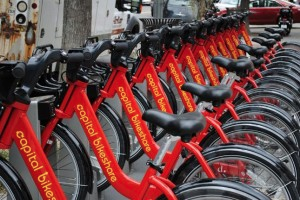
Bike shares are one of the fastest-growing modes of transportation in the country. Since the first U.S. bike-share system launched in 2008, the systems have spread like wildfire. Bike sharing allows users to rent bicycles from kiosks placed throughout a city and return them to any other location, creating a hassle-free way to get around. In just four years, 30 U.S. cities have launched bike shares, and many others have plans in the works. This year alone, 8 new cities have created bike shares and with more set to launch before the end of the year, 2012 may prove to be the biggest year for bike shares yet. Look for your nearest bike share on this map.
Americans are looking for cleaner and more affordable transportation choices. As city centers are choked by automobile traffic, bike shares become an increasingly attractive option for getting around. In Capital Bikeshare's 2011 Member Survey, more than 41 percent of users reported reducing their number of car trips after joining bike share. These users reported driving an average of 523 miles less per year after becoming a bike share member, which translates into avoiding releasing 487.7 pounds of carbon dioxide into the atmosphere per bike share user. In Capital Bikeshare's first year alone, the system's members saved more than 1,632 tons of carbon dioxide just by replacing car trips with bike trips. By reducing our dependency on driving and oil, bike shares can have a significant environmental benefit.
Biking also helps save money by reducing the amount you need to spend on car payments, insurance, and oil. Most bike share systems offer year-long, monthly, and short-term memberships with no additional fees for trips under 30 minutes. With year-long memberships usually priced around $75, the cost of bike share is still very low compared to other means of transportation. In a 2011 Member Survey, Capital Bikeshare users reported saving an average of $819 per year. Most of these savings came from avoiding costs related to driving like gas, parking, and vehicle maintenance. Others reported saving money by replacing taxi trips with bike-share rides.
Another benefit of bike shares is that they not only add another mode of transportation to the existing city fabric but also do so faster and more cheaply than many other transportation projects. Bike shares in cities like Minneapolis and Washington, D.C., took between 12 and 18 months to get up and running after being announced. That seems like the blink of an eye compared to the years and even decades that highway and public transit expansions often take. Though costs vary based on the size and location of the system, Minneapolis-St. Paul was able to implement the first 700-bike phase of their system, Nice Ride Minnesota, for $3.2 million. The cost of creating a single mile of urban highway averages $60 million, making bike sharing a relatively inexpensive way to relieve urban congestion.
Bike shares can also help boost the local economy. Some local bike shop owners in Washington, D.C., were concerned that people might buy fewer bikes if bike sharing were an option. However, Capital Bikeshare proved to be the "gateway drug" for many new bicyclists, who have flocked to bike shops to buy their own set of wheels. Bike shop owners have seen an increase in bike sales in the two years since Capital Bikeshare began operating, and many new customers have said that they were inspired to purchase their own bike after using bike share.
Bike sharing has been around for decades but didn't catch on until technological improvements in the past few years made modern third-generation bike-sharing systems possible. Previous free and coin-operated systems suffered from rampant theft and never caught on, but membership requirements and improvements in bike tracking technology have reduced theft and damage to practically zero. Sophisticated systems that allow bikes to be easily checked-out have also made the systems increasingly popular with users. European cities began using these advanced bike-sharing technologies for city-wide systems in 2007. After seeing that success and recognizing the increased demand for transportation choices, many U.S. cities quickly followed.
Capital Bikeshare in Washington, D.C., is one of the oldest and best-known bike-sharing systems in the United States. Launched in 2010 with 1,100 bikes at 114 stations throughout Arlington and the District of Columbia, the system now boasts over 1,670 bikes at 175 stations, making it the largest in the country. The program is considered a wild success, with 18,000 members in its first year alone. Large metropolises like Denver and Boston, and even smaller cities like Chattanooga, Tennessee, and Spartanburg, South Carolina, have adopted bike shares. Many other cities have plans in the works, including New York City's CitiBike system, which will become the nation's largest bike share when it opens later this year, and cities like Los Angeles and Fort Worth, which plan to launch their systems in 2013.
-- Erin Gustafson, Sierra Club Green Transportation
No comments:
Post a Comment